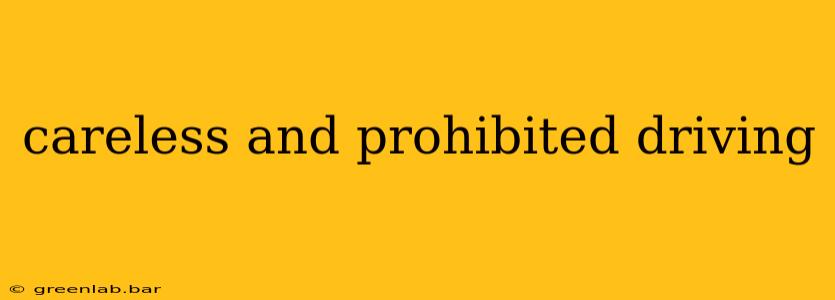Driving is a privilege, not a right, and with that privilege comes significant responsibility. Careless and prohibited driving encompasses a broad range of offenses that endanger not only the driver but also other road users and pedestrians. Understanding the differences between these offenses, their potential consequences, and how to avoid them is crucial for ensuring road safety.
What Constitutes Careless Driving?
Careless driving is generally defined as driving without due care and attention, falling short of the standard expected of a competent and careful driver. This is a subjective assessment, often determined by factors like:
- Speed: Exceeding speed limits, even slightly, in inappropriate conditions (e.g., heavy rain, poor visibility) can be considered careless.
- Following Distance: Tailgating or driving too closely to the vehicle ahead significantly increases the risk of collision and demonstrates a lack of care.
- Overtaking: Reckless overtaking maneuvers, particularly in hazardous conditions or without adequate visibility, are a common example of careless driving.
- Distraction: Using a mobile phone, eating, or engaging in other distracting activities while driving significantly impairs judgment and reaction time.
- Road Conditions: Failing to adjust driving behavior to account for adverse weather conditions, like snow or ice, shows a disregard for safety.
- Vehicle Condition: Driving a vehicle in a known unsafe condition, such as with faulty brakes or worn tires, is also considered careless.
The consequences of careless driving can range from fines and penalty points on your driving license to a court appearance and even imprisonment in severe cases.
Understanding Prohibited Driving
Prohibited driving moves beyond carelessness and encompasses actions explicitly forbidden by law. These offenses are typically more serious and carry harsher penalties. Examples include:
- Driving Under the Influence (DUI): Driving while intoxicated by alcohol or drugs is a serious offense with severe legal consequences, including lengthy license suspensions, substantial fines, and potential jail time.
- Driving While Suspended or Revoked: Operating a vehicle after your driving privileges have been suspended or revoked is a serious crime, often resulting in further penalties.
- Racing: Engaging in illegal street racing or speeding competitions is a dangerous and illegal activity that can lead to significant fines, imprisonment, and license revocation.
- Reckless Driving: This often involves a pattern of dangerous driving behaviors that demonstrate a blatant disregard for the safety of others. This is a more serious offense than careless driving.
- Driving without insurance or a valid license: These offenses are directly prohibited by law and carry significant fines and potential legal repercussions.
The Severity of the Consequences
The penalties for careless and prohibited driving vary depending on the jurisdiction and the specific offense. However, the potential consequences are generally severe and can include:
- Fines: Significant financial penalties can be levied, impacting your finances and potentially leading to further difficulties.
- License Suspension or Revocation: The loss of your driving privileges can severely impact your daily life, work, and personal commitments.
- Imprisonment: In severe cases of prohibited driving, particularly involving accidents causing injury or death, imprisonment is a possibility.
- Increased Insurance Premiums: Convictions for careless or prohibited driving will drastically increase your insurance premiums for years to come.
- Criminal Record: A criminal record for driving offenses can have far-reaching consequences, affecting future employment prospects and other aspects of your life.
Driving Safely: A Shared Responsibility
Safe driving is a shared responsibility. By understanding the nuances of careless and prohibited driving, and by adhering to traffic laws and driving safely, we can all contribute to creating safer roads for everyone. Remember, responsible driving isn't just about avoiding penalties; it's about protecting yourself and others.
Disclaimer: This information is for general educational purposes only and does not constitute legal advice. Consult with legal professionals for advice specific to your situation and jurisdiction.

